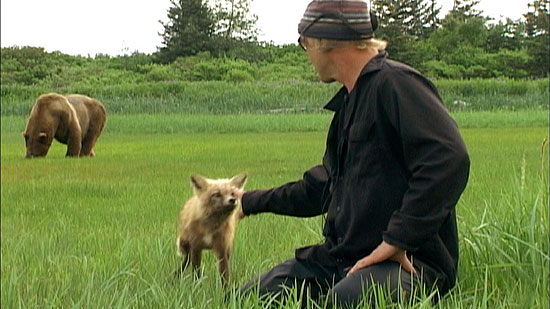On the Bavarian filmmaker and his recent documentary

In his review of Me and You and Everyone We Know (Miranda July, 2005), Asad Haider critiques the Slovenian scholar Slavoj Zizek’s analysis of modernism and postmodernism when he writes, “Imagine if, in Samuel Beckett’s play, Godot actually did come – and he was just a regular guy. This… encapsulates the difference between modernism and postmodernism… the key figure in modernism is the absent centre, the emptiness that enables any social structure but which, at the same time, cannot be found within it.” The tramps in Beckett’s seminal play wait absurdly for Godot, who never arrives. The play’s beauty is derived from the lack of an encounter with the narrative’s driving force, Godot, and that lack of an encounter defines Beckett’s modernist play. Conversely, postmodernism is “a matter of overwhelming presence; that is, an obscene, dull intimacy with the object(s) that defines the system”. Postmodernist theory emerges from the repeated, almost crude, encounters we have with objects that carry value and meaning. Commercial, technological, cultural, or other forces fuel those encounters, and they force us to redefine the meaning and value of those objects. This analysis is also applicable to Werner Herzog’s provocative 2005 documentary Grizzly Man: the bears are similar to Beckett’s Godot, but in Herzog’s documentary, they arrive with a profane intimacy.
Werner Herzog has had a long and varied career, well-known and respected for a series of films featuring Klaus Kinski, and a collection of strange, sometimes bizarre, documentaries. Grizzly Man is one such documentary, piecing together a narrative from the home video footage of one Timothy Treadwell, a failed actor who for thirteen summers embraced the elements and lived amongst grizzly bears in the great outdoors of a national park nature reserve.
Herzog intones a typically Germanic, often philosophical narration, and perfectly counteracts the somewhat naive optimism of Treadwell's goal to seek a closer connection with nature. Treadwell is a fascinating subject for a documentary filmmaker, with an infectious sense of humour and enthusiasm. As the documentary progresses, Treadwell manages to achieve a rare and intimate closeness with the wildlife that surrounds him. In some sense, Treadwell's story offers us the archetypal human aspiration of a return to nature, but it is an aspiration fraught with numerous difficulties and some very real dangers.
As each year passes, Treadwell is determined to further ingrain himself into his surrounding environment, and in doing so seems to completely overlook the fundamental limitations of his status as a human being in the wilderness. On the one hand, Treadwell follows a kind of spiritual quest towards human solitude, and tries to embrace a kinship with the animal kingdom. But these are sentiments that forever belong to human culture, and are soon rendered incompatible in the wilderness. Treadwell's blindness to these limitations ultimately leads to his tragic death, and that of his girlfriend, who dies attempting to defend him from a bear attack.
Grizzly Man is both fascinating and heartwarming by turns, but avoids any trace of sentiment or kitsch. The narrative is handled wonderfully by Herzog, who treats his subject with respect and sensitivity. I regret to say that I haven't seen anything else that Werner Herzog has produced up until this point: perhaps now is the time to change that.


